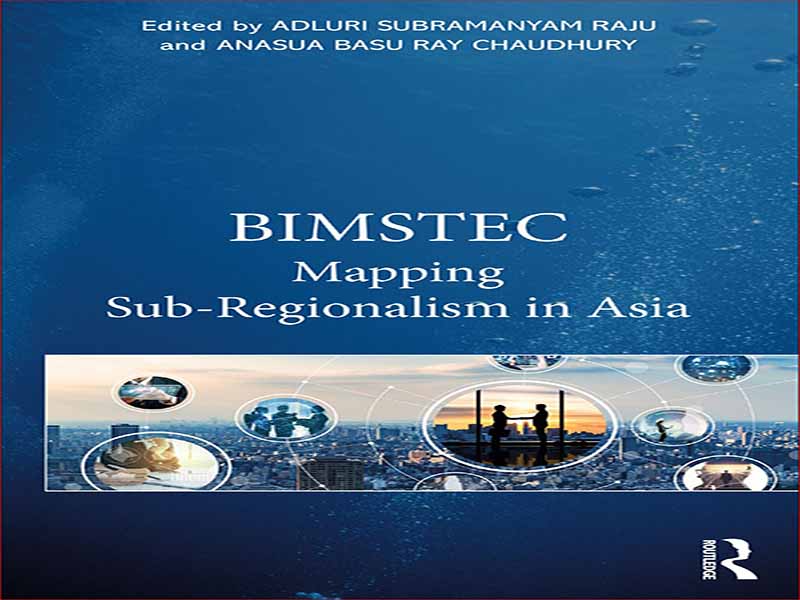- عنوان: BIMSTEC / Mapping Sub-Regionalism in Asia
- نویسنده: Adluri Subramanyam Raju
- حوزه: دموکراسی
- سال انتشار: 2022
- تعداد صفحه: 226
- زبان اصلی: انگلیسی
- نوع فایل: pdf
- حجم فایل: 25.3 مگابایت
این جلد یک مطالعه جامع از چالش ها و فرصت های پیش روی BIMSTEC، ابتکار خلیج بنگال برای همکاری های فنی و اقتصادی چند بخشی است. BIMSTEC برای ارتقای همکاری اقتصادی بین قدرتهای اقتصادی در حال رشد در آسیای جنوبی و جنوب شرقی تأسیس شد، اما پس از سالها رکود، نیاز به تجدید تعهد منطقهای بیش از همیشه است.
این کتاب وضعیت فعلی BIMSTEC را مورد مطالعه قرار میدهد و راههایی را برجسته میکند که در آن سازمان میتواند برای ایجاد یک جامعه قویتر خلیج بنگال تجدید قوا کند. این مقاله به موضوعات کلیدی مانند چالشهای یکپارچگی منطقهای، سیاستهای «نگاه به شرق» هند و «نگاه به غرب» تایلند، اتصال حملونقل و گردشگری در BIMSTEC و آرمانهای کشورهای مختلف عضو میپردازد. همچنین رویکرد BIMSTEC نسبت به تغییرات آب و هوا، مدیریت بلایا و توانبخشی را بررسی می کند.
این جلد با کمک به موقع، برای محققان و محققان روابط بینالملل، مطالعات جنوب آسیا، سیاست خارجی، دیپلماسی، مطالعات آسیای جنوب شرقی، امور دفاعی و استراتژیک، مطالعات دریایی، تجارت بینالملل، همکاریهای منطقهای و مطالعات سیاسی مفید خواهد بود.
ابتکار خلیج بنگال برای همکاریهای فنی و اقتصادی چندبخشی (BIMSTEC) حتی پس از گذشت بیش از دو دهه از وجود خود، هنوز در مراحل اولیه خود است. در واقع، در زمان های اخیر برجستگی خود را به دست آورده است، اگرچه سرعت توسعه آن کند است و سازمان هنوز اساسنامه خود را تنظیم نکرده است. BIMSTEC دارای پتانسیل بسیار زیاد با تولید ناخالص داخلی 3.697 تریلیون دلار آمریکا در سال است و 1.68 میلیارد نفر را پوشش می دهد که تقریباً 22 درصد از جمعیت جهان را تشکیل می دهد. با ماهیندا راجاپاکسا، نخست وزیر سریلانکا، اطلاع داد که منشور BIMSTEC برای تصویب در نشست بعدی سران خود که قرار است در کلمبو برگزار شود، آماده خواهد بود. همکاری در رسیدگی به موضوعات جنایی، تسهیلات انتقال فناوری BIMSTEC و ایجاد مؤسسات آموزشی دیپلماتیک نهایی خواهد شد. مبارزه با قاچاق مواد مخدر و ترویج گردشگری در این زمینه قابل توجه است که در شانزدهمین نشست وزیران BIMSTEC که در 28 آگوست 2018 در کاتماندو برگزار شد، تایلند پیشنهاد داد تا ساختار همکاری BIMSTEC را سادهتر کند تا آن را کارآمدتر و پاسخگوتر به چالشها و فرصتهای در حال ظهور باشد. تایلند پیشنهاد کرد که 14 حوزه همکاری موجود را در پنج محور اصلی همکاری قرار دهد: اتصال، تجارت و سرمایه گذاری، تماس مردم با مردم، مبارزه با تروریسم و جنایت/امنیت فراملی، و علم و فناوری. مقاله مفهومی مورد استقبال همه اعضا قرار گرفته است.
This volume is a comprehensive study of the challenges and opportunities facing the BIMSTEC, The Bay of Bengal Initiative for Multi-Sectoral Technical and Economic Cooperation. BIMSTEC was established to promote economic cooperation among rising economic powers in South and Southeast Asia, but after years of stagnation the need for renewed regional commitment is starker than ever.
The book studies the BIMSTEC’s present status and highlights the ways in which the organisation can be rejuvenated to forge a stronger Bay of Bengal community. It looks at key themes such as the challenges to regional integration, India’s “Look East” and Thailand’s “Look West” policies, transport connectivity and tourism within the BIMSTEC and the aspirations of various member countries. It also examines BIMSTEC’s approach towards climate change, disaster management and rehabilitation.
A timely contribution, this volume will be useful for scholars and researchers of international relations, South Asian studies, foreign policy, diplomacy, Southeast Asian studies, defence and strategic affairs, maritime studies, international trade, regional cooperation and political studies.
The Bay of Bengal Initiative for Multi-Sectoral Technical and Economic Cooperation (BIMSTEC) is still in its nascent stage even after more than two decades of its existence. Indeed, it has gained its salience in recent times, though the pace of its development is sluggish and the organisation is yet to frame its charter. BIMSTEC has immense potentiality with a combined GDP of US$3.697 trillion/per year and covers 1.68 billion people, which is almost 22 percent of world’s population.1 The former Secretary General of the organisation Mohammad Shahidul Islam, in a meeting held on 4 March 2020 with Sri Lankan Prime Minister Mahinda Rajapaksa, informed that the Charter of BIMSTEC would be ready for adoption at its next summit meet¬ing scheduled to be held in Colombo.2 During the upcoming 5th BIMSTEC Summit, it is expected that at least three agreements on cooperation in addressing criminal matters, BIMSTEC technology transfer facility and estab¬lishment of diplomatic training institutions would be finalised.3 Other sectors to enhance cooperation in the Bay of Bengal region possibly would also be discussed, including sharing of intelligence, inter-regional trade, combating drug trafficking and promoting tourism. It is noteworthy in this context that, in the 16th Ministerial meeting of BIMSTEC held on 28 August 2018 in Kathmandu, Thailand proposed to streamline BIMSTEC’s structure of coop¬eration to make it more efficient and responsive to the emerging challenges and opportunities. Thailand suggested to reprioritising the existing 14 areas of cooperation into five primary pillars of cooperation: connectivity, trade and investment, people-to-people contact, counterterrorism and transnational crime/security, and science and technology. The concept paper has been well received by all the members.
این کتاب را میتوانید از لینک زیر بصورت رایگان دانلود کنید:



































نظرات کاربران